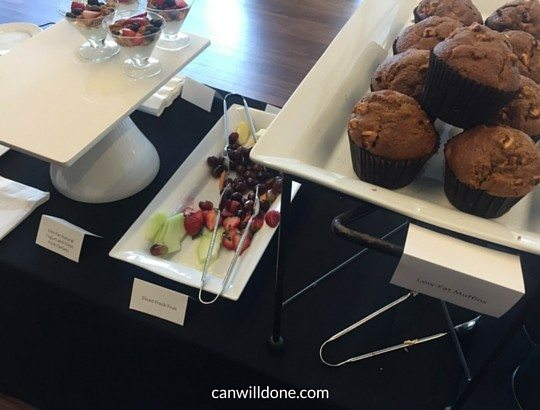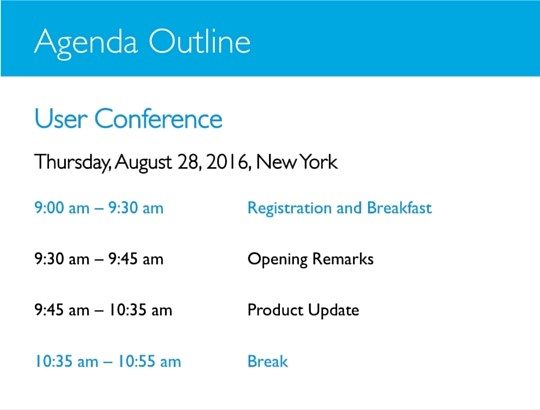Caught with Your Pants Down: You Weren’t Prepared for This
It is the morning of the conference you are attending.
You left your room with the intention of having breakfast when you got to the conference location.
Originally, you had hoped to have something other than conference food. Your fear was that there would be a carbohydrate overload, but your morning got away from you and you needed to be there for the start of the conference festivities.
After registering, you make a bee line to the room where you were told breakfast would be held.
You walk through the doors of the room, scanning the room for the promised breakfast.
You take a couple of steps, then stop.
“Bah!! Really?!!” you shout in your head.
“Bagels, croissants, and muffins. Where’s the protein? Where’s the protein?!” You are beside yourself.
THIS is not what you were hoping to see. It is your worst nightmare come true: carbohydrate overload!
You had been doing so well cutting back on such foods; now you are faced with this.
All hope is not lost, you hope.

Is All Hope Lost? Will You Cave into the Carbs?
Have you experienced something like this scenario before?
You are working on changing what you eat, trying to avoid foods made with, sugar, white flour, and that do not have much nutritional value to be put smack dab in the middle of exactly what you are trying to avoid: carbohydrate overload.
I recently was in a very similar situation. I started from home, not a hotel, but I ran out of the house without having a breakfast and with my commute, not much time to get something for myself. I was left to rely on the conference-provided food.
What I described above was close to my options.
Is all hope lost?
No, all hope is not lost. You can indeed avoid carbohydrate overload.
This post will share the options we have when we get caught in such a situation. I will also cover what we can do to not be caught with our pants down by sharing four sure ways you can avoid carbohydrate overload at your next conference.
Carbohydrate Overload Wars: Understand Good vs. Bad
I have read a lot that carbohydrates get a real bad rap. That should not be the case. We need carbohydrates.
A Brief Introduction to Carbohydrates
Carbohydrates are a macronutrient. That’s a good thing.
Carbohydrates are also one of your body’s primary sources of energy. If you attending a conference that was not all that exciting, you may need all the energy you can get.
You need not avoid carbohydrates. Instead you need to eat the right kind of carbohydrates. Those are complex carbohydrates. This type of carbohydrate is the one with more nutrients, are high in fiber, and that digest slowly.
Bad Carbohydrates
Let’s go back to our conference breakfast room.
Your options, at first glance, were bagels, croissants, and muffins.
Because of the reaction I gave you in our little vignette, you know that these options are not complex carbohydrates. Why?Macronutrients and fiber are sorely lacking.
Even if the muffins were bran muffins or labeled as low fat, they are essentially a cake. More than likely they contain a lot of sugar, which is a simple carbohydrate. Other simple carbohydrates you are probably familiar with are soda, juice, cookies and cakes. That being the case, opt to leave that muffin right where it is, unless…I will get to that in a minute.
Good Carbohydrates
Back to our story.
Before you completely freak out, you see small bowls on the the table. The bowl contents include, strawberries, blackberries, blueberries, and raspberries. You also see a small dish with yogurt, topped with granola, and a small amount of the same type of fruit.
All hope is not lost.
Here is why.
These fruit offer dietary fiber. Golden! You now have your complex carbohydrates.
Diagnosing and Modifying Additional Options
But what about that bowl of yogurt?
Well, this one you do not have much certainty.
Yes, the yogurt is a protein, but is it a fat free yogurt? How much sugar does it have?
And what about the granola?
That can be loaded with sugar. Even without knowing for certain the nutritional information about the yogurt, fruit, and granola mix, you are still better off with that than with the bagel, croissants, or muffin.
To remove some of the uncertainty you can easily remove the granola.
Let’s say, however, there was no fruit available. What would you do then?
I would go with the rule of moderation.
Given the three choices of a bagel, croissants, or muffin, I would choose the “low fat” muffin, knowing that is might be loaded with sugar.
If it was a big muffin – say one where you could not wrap your hand around the whole thing without squishing it – I would only eat about a quarter or half of it. To ensure that I did not eat the whole thing, I would offer the rest to someone else. If I had no takers, I would begrudgingly throw it away. (There are hungry people in the world. I would hate doing that.)
How Will You Avoid Carbohydrate Overload?
In our story we ran out to the conference leaving our fate in the hands of the conference organizers. I was nice enough to at least offer a so called breakfast. Some conferences do not even offer that. Whatever the case may be, an offering of breakfast or not, what I share next holds true.
1. Be proactive
Before you head to your conference be sure to check the agenda. You are looking to see if breakfast will or will not be served.

2. Be sure to ask questions
This too is in the lines of being proactive. You need to know this information ahead of time. You will understand why in the next tip. If the agenda is not clear, reach out to the conference organizers. If the agenda states “breakfast” ask if it is a full breakfast and with what, or if it is a continental breakfast and consisting of what.
3. Bring your own food
This is why you want to ask the above questions ahead of time. To avoid the scenario above, it is best that you bring your own food. That gives you all the control. It also ensures you stick with your goals and intentions.
4. Scope out area restaurants
We are not always in a place where we can bring food from home. In this case, use Yelp or canvas the area before heading to the conference to find viable options. You may find this challenging in some areas. Strive for getting the best options possible.
For certain, if you follow these four tips, you will avoid carbohydrate overload at your next conference. Be sure to check back here as a reminder of what to do.
Share in the Discussion: What methods to you use to ensure you are getting complex carbohydrates in your diet? Share in the post comments, on Facebook or Twitter.